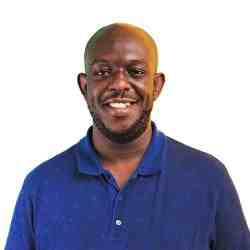Introduction
Miss Rizos works to eradicate the discrimination against the curly hair characteristic of Afro-descendant populations as a means of addressing broader issues related to race and color.
The New Idea
The novelty and effectiveness of Carolina’s approach stem from having found a simple and accessible channel - namely, hair - through which people can more easily grapple with a problem as complex as systemic racism. For too long, schools in the Dominican Republic have forbidden children to wear their naturally curly hair loose and workplaces have severely condemned it. The natural textured hair of black women is called “pelo malo” (bad hair) or worse: broom hair, prostitute hair, and so on. Carolina has identified a critical path she can pave toward the empowerment of black women, beginning with changing societal perceptions of black features. Celebrating curly hair serves as a graspable entry point for cultivating acceptance of and pride for Afro-descendant populations in general.
Toward these aims, Carolina empowers women and girls through a pioneering all-curly hair salon in Santo Domingo, workshops, and an influential social media presence. The salon serves as a vehicle of social change, where customers not only learn how to flaunt and care for their natural curls, but also how to stand up to societal discrimination by using the Constitution in their defense. Such discrimination is codified in unspoken rules in many schools, businesses, and government institutions, which oblige women and men to have their hair straightened. Carolina’s focus on empowering women in her salon and her workshop-based curriculum equips young black girls with the confidence and knowledge they need to fight these rules and other discriminatory standards. The workshops have already been adopted by a number of organizations, including the Peace Corps, as well as replicated by girls who have completed the program and started their own clubs for younger girls in their communities. Carolina’s blog and social media accounts already reach broad international audiences, diffusing her messages of empowerment to ever growing audiences. As discrimination against curly hair is prevalent in many countries where African slaves were brought to Latin America and the United States hundreds of years ago, Carolina is replicating her project in New York City and in the near future in Cartagena, Colombia. Her ultimate goal is to eradicate discrimination against curly hair throughout the Americas.
Beyond creating her own online and physical spaces to celebrate women who maintain their natural curls, Carolina also promotes greater representation of Afro-descendant women in politics, the media, and other spheres of influence. Through this combination of strategies, Carolina is deconstructing the myth that the only acceptable hair is straight hair, and producing mindset shifts toward less discrimination against and greater celebration of black beauty across all levels of society.
The Problem
Black identity, particularly black female identity, has a long and troubled history in the Dominican Republic and throughout the Americas. Colonialism’s deeply rooted legacies of discrimination and segregation still reverberate across Latin American societies in uncountable ways. While Afro-descendant activists have made important strides in uprooting these legacies, change is slow and difficult. The lack of self-acceptance is still a tremendous problem among black women and girls, and notions that uphold whiteness and European custom as the standards of beauty, professionalism, and success remain entrenched.
With 57,000 hair salons for straight hair and just 10 for curly hair in the Dominican Republic, the message is clear: conform to a straight-haired, Eurocentric image of beauty and propriety, or risk ostracism from society. These numbers are particularly troubling considering that the population of the Dominican Republic is 92% Afro-descendant. Yet many Dominicans have historically denied and tried to hide their blackness in hopes of being better accepted and advancing in society. Otherwise, the ostracism begins at an early age, with young schoolgirls being asked to leave their classrooms for not having their curls properly “tamed”. Rules that dictate how children should wear their hair for school discriminate - intentionally or unintentionally - against black children. Signs and posters in classrooms indicate how students should wear their hair, showing natural curls as the “wrong” way to arrive to school. In a recent incident, a girl was sent home from school for wearing her natural curls. A Miss Rizos client in the Ministry of Education who spoke out against the incident was fired, indicating the persistent strength of the pressure to conform. Afro-descendants have even had their basic civic rights threatened, as government officials who issue identification cards required for voting have refused to accept photos of people wearing their natural hair. Carolina experienced such discrimination firsthand once when she and a group of friends were turned away from a bar in Santo Domingo because they were wearing their hair natural and loose.
Beyond such egregious instances of discrimination, a more subtle form occurs in the lack of Afro-Dominican representation in the media, in politics, and in positions of power across diverse sectors. For black girls in particular, being unable to see role models who look like them represented in high level positions has profoundly negative effects on their self-esteem and development. For decades, the main method of addressing this divide was to assimilate black Dominicans to the image of those in power, including by imposing pressures to relax their hair. These issues of discrimination and assimilation occur not only in the Dominican Republic, but throughout Latin America and anywhere Afro-descendant communities are found.
The Strategy
The Miss Rizos strategy comprises three main branches: the one-stop-shop hair salon, empowerment workshops, and online activity. The Santo Domingo salon sits on the same street where in another century, Africans were sold as slaves. Now, the space is used to inform customers - many of whom are descendents of those original Afro-Latinos - and spread Carolina’s messages of confidence and empowerment. In her salon, Carolina sees 1,000 women and girls per month, and each of them is attended to by a Miss Rizos employee trained in teaching customers how the Constitution can be used to combat discrimination.
Carolina recently opened her second salon in the Washington Heights neighborhood of New York City, which is home to a large Dominican population. The salons perform the dual function of financial model and vehicle for social change. Profits generated by the salons are reinvested in growing Miss Rizos’ workshops and other social impact efforts. At the salons, Carolina also hopes to soon begin selling branded hair care products as another source of revenue.
The Miss Rizos workshops address themes of empowerment and identity. Facilitators ask participants about what kind of women they see in the media, and who they would put in magazines and on television shows if they could choose. This leads to broader discussion about the importance of self-love and self-esteem, especially in a society that does not always reflect the diversity of its people in positions of power and leadership.
One material used in these workshops is a comic book that educates women and girls on their constitutional rights. It depicts the story of Sara, a young girl dismissed from her classroom for showing up with her natural curls. As she leaves school, a curly-haired superhero shows up to inform Sara that the Constitution of the Dominican Republic protects citizens against these situations. Specifically, Article 39, the Law of Equality, dictates that all people are born free and equal before the law and may not be discriminated against on the basis of gender, color, age, disability, nationality, family ties, language, religion, political or philosophical opinion, or social condition. Sara returns to school to tell the principal that not permitting her to attend classes because of her curly hair is an act of discrimination and a violation of her constitutional rights. The principal concedes, and Sara returns to class for the day’s lesson.
Carolina has consolidated her curriculum into a handbook that has been used by various schools and organizations, multiplying the Miss Rizos impact manifold. Miss Rizos links with a summer camp to offer its workshops, which has allowed it to reach another 1,200 girls in the past four years. Last year, Miss Rizos also trained nine Peace Corps volunteers, each of whom is based in a different province of the Dominican Republic, thereby creating thousands more direct and indirect beneficiaries of the empowerment methodology. Moreover, 7,000 copies of the comic book have been distributed in the past year.
Miss Rizos’ online presence manifests in a blog, across various social networks, and in important media outlets such as CNN and the New York Times. Through these mediums, Miss Rizos has reached more than 220,000 people in over 30 countries. As her online presence has grown, Carolina has become a role model for going against established norms. Last year, after sharing online that she was holding a picnic in New York’s Central Park, Carolina was joined by more than 250 fans and followers, demonstrating her effective use of social media influence. On a trip to Colombia, a woman from the isolated, largely Afro-Colombian state of Chocó took multiple flights to come see Carolina and give her a sample of the coconut oil hair care products she had been inspired to develop thanks to her blog.
Carolina also engages in various campaigns to fight discrimination in public and private institutions. For example, she led an effort to eradicate acts of electoral discrimination in which officials refused to issue the photo identification cards required for voting to people wearing their natural curls. Miss Rizos has become a known reference for standing up to such injustices. She has attracted well-known public figures to her cause, including author Junot Diaz and playwright Lin Manuel Miranda. She even styled the curls of a Miss Universe contestant from the Dominican Republic, who went on to make history for wearing her natural hair in a contest in which Dominican women had historically always appeared with straightened hair.
Key to Carolina’s expansion strategy is that as she replicates one branch of the strategy, she replicates the others alongside it, creating integrated one-stop-shops that include a physical salon tied to empowerment programming from the beginning. Her aspirations include operating up to five salons, each profitable and financially sustainable, and each embodying a micro-level impact of her work accompanied by the macro-level impact wrought by the other strategy branches. Beyond this handful of her own salons, Carolina envisions creating franchises that are certified by Miss Rizos, which will offer trainings from haircare to the empowerment workshop curriculum. This academy will open the doors for others to create their own salons and magnify the Miss Rizos impact around the world wherever discrimination exists.
Other future plans include opening summer camps for girls in 10 provinces around the Dominican Republic. These camps will further the great ripple effect of Carolina’s work, especially since many of the girls trained by Miss Rizos have gone on to create their own initiatives aimed at inspiring people to embrace their natural selves and celebrate their identities. Furthermore, Carolina plans to work with the Ministry of Youth to integrate her empowerment curriculum into schools across the country. In these ways, Carolina is cultivating a world in which black people and black identity enjoy greater representation in all fields, thereby empowering the next generation of black girls with the hope that they, too, can aim high and achieve whatever they set their minds to. The growing numbers of women wearing their curls loose in the streets of the Dominican Republic and across diverse sectors of society indicate that Carolina is on the right track toward systemic social change.
The Person
Born in the Dominican Republic, Carolina migrated with her family at an early age to the United States, where she spent her childhood and adolescence in a multicultural community near Boston, Massachusetts. Growing up in a poor household plagued by drug use and alcohol consumption, Carolina suffered considerably. Now she is proud to have graduated from university, traveled the world, and started her own social enterprise. Her difficult childhood remains one of her biggest motivations, as she hopes that sharing her story of transforming pain into power will give other girls the hope that they, too, can overcome their hardships to achieve great goals.
Throughout her early years, Carolina exercised leadership in many outlets. In high school, she started a program called Atrévete Latino Youth, aimed at helping Latino youths pursue college educations. At university, she founded a bilingual program to teach English to the custodial staff, an initiative which has continued to grow since she graduated.
A blessing in disguise arrived when Carolina was stranded in Atlanta for the day due to a canceled connecting flight. She reconnected with an old friend there who introduced her to local artists, including Jerome “Jerry” Wright, the first black PhD graduate from Harvard in social anthropology, who wrote his thesis on blackness in the Dominican Republic. This chance encounter led Carolina to think more about her Dominican roots, and soon after she decided to plan a two month trip there.
After exploring the Dominican Republic during this time, she felt compelled to miss her flight back to the USA and stay rooted where she was. Her family questioned her choosing to do the reverse of what they had done in leaving the Dominican Republic to pursue a better life in the USA, leading Carolina to battle constantly to prove that her decision was meaningful and worthwhile. The first position she found in the Dominican Republic was with a nonprofit that advocates for sex workers and those affected by HIV/AIDS through various healthcare interventions and educational programs. During this time, Carolina grew increasingly troubled by pervasive perceptions that associated black people with prostitution and violence, while white people were the successful decision makers. These early experiences fomented Carolina’s concern for societal injustices, particularly the absence of black female role models in society, and left her craving systemic change rather than bandaid solutions.
Around this time, Carolina decided to cut all her hair off, something she had dreamed of doing for years but always postponed. In response to this bold move, women stopped her in the street to ask her how she dared to do it and how she was taking care of her hairstyle. Realizing that not much information about this taboo subject existed online in Spanish, Carolina decided to create a virtual space to respond to those questions, giving birth to the Miss Rizos blog.
Carolina turned her studio apartment into a mini beauty parlor to give her blog followers haircuts combined with empowerment talks, and soon after progressed to renting a small hole-in-the-wall space. From that point, her community continued growing, eventually reaching the international popularity that Miss Rizo today enjoys.
Carolina’s own journey of discovery - from following her instincts back to the Dominican Republic multiple times, to cutting her hair off and helping others to go against the tide with their hairstyle choices as well - has served as the inspiration for guiding other women and girls along their own journeys of discovery, and builds momentum toward eradicating discrimination against curly hair worldwide.




